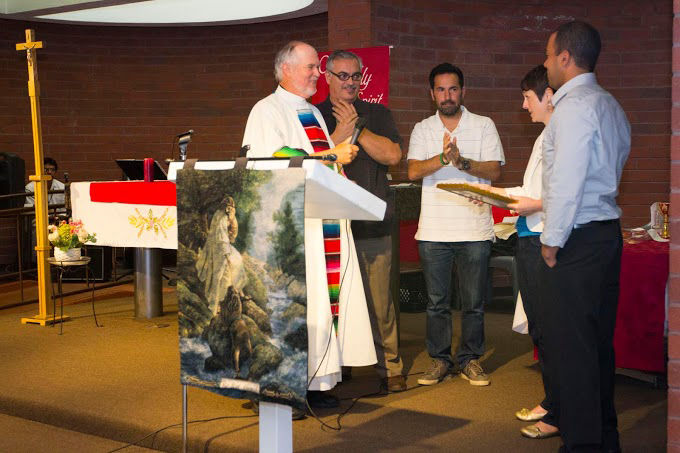Chances are that when at the time this article is being read, a child in the underserved areas of Los Angeles (or in any part of the world) is being victimized by some form of abuse, usually by an adult close to him or her, or is being neglected by his or her parents or guardians.
A large percentage of children who have gone through such trauma, if untreated, will be negatively affected. Many may end up in juvenile halls and, in the United States, condemned to die in prison.
Children like this were represented at a June 8 morning Mass at Barry J. Nidorf Juvenile Hall in Sylmar. Attired in gray T-shirts and blue slacks, the incarcerated youth listened attentively as restorative justice advocates explained the work being done to make the criminal justice system rehabilitative and restorative, instead of punitive.
They also paid attention when Jesuit Father Michael Kennedy, celebrant, read a letter from Pope Francis addressed to U.S. youth sentenced to life in prison without the possibility of parole (LWOP).
Pentecost is “the day the Spirit came upon people who had lots of fear,” said Father Kennedy, the juvenile hall’s co-chaplain, explaining that the restorative justice advocates were invited because they have worked hard for reform, “so kids can have a second chance.”
In March, Jody Kent and her colleagues at the Washington, D.C.-based Campaign for Fair Sentencing of Youth started a project in prisons throughout the country, inviting people sentenced to life without the possibility of parole (LWOP) as children to write a letter to Pope Francis, asking his intercession for fair sentencing for youth and the elimination of the harsh sentence.
“Pope Francis, may I please ask you to speak out against this deplorable US policy to sentence children to die in prison?” wrote one of the prisoners, “I know through my own experiences that children grow. I have grown. I would not ask you to consider doing this if I knew in my heart my life was not different. I pray that you get to read my letter.”
And the pope took the time to read that letter and more.
“I have read the letters which you kindly sent to me from hundreds of young people from throughout the United States sentenced as juveniles to life imprisonment without parole,” he wrote in a letter addressed to Father Kennedy, who sent the package of letters to the Pope last April.
He continued, “Their stories and their plea that this form of sentencing be reviewed in the light of justice and the possibility of reform and rehabilitation moved me deeply.”
The U.S. is the only country that imposes LWOP sentences on youth under 18, with African Americans at a per capita rate 10 times higher than white youth, and Hispanic youth five times higher.
In a May 30 message sent to lawyers gathered in Buenos Aires, Pope Francis offered his Scriptural-based solution, “part of the millennial experience of the People of God,” which includes three aspects: satisfaction, or reparation of damage; confession, by which a person expresses inner conversion; and contrition, leading to God’s merciful and healing love.
“It is a matter of bringing justice to the victim, not punishing the aggressor,” he said. “It would be a mistake to identify reparation solely with punishment, to confuse justice and vengeance, which can only contribute to increasing violence, even if this latter is institutionalized.”
“The Church proposes a form of justice that is humanizing, genuinely reconciliatory, a justice that leads the wrongdoer, through an educative path of encouraged penance, to rehabilitation and total reinsertion in the community.”
On Pentecost Sunday morning, for about 90 minutes, the small chapel at Sylmar’s juvenile hall resembled the educative and rehabilitative environment described by the Pope.
Scott Budnick, executive director of the Los Angeles-based Anti-recidivism Coalition, spoke about California’s passage of laws such as SB9 and SB260 to review cases of children sentenced to lengthy sentences or LWOP. A former film producer (“Hangover 1, 2 and 3”) and now juvenile advocate, Budnick noted that California has the highest rate of recidivism (70 percent), and how his organization is currently helping 181 young people either in prison or recently released attend college.
“If you are serious about changing and you want to succeed, we can help you succeed,” Budnick told the young assembly.
“No child is born bad,” added Xavier McElrath-Bey, who was sentenced to 25 years in prison at the age of 13 for a first-degree murder and was released after serving 13 years. He described growing up in an abusive environment (at home and in the neighborhood), joining a gang, being sentenced and imprisoned, and finally realizing that his life was worth something.
“There’s so much beauty in doing right,” said McElrath-Bey, who earned a bachelor degree in prison, upon his release earned a master’s degree, and is now a juvenile advocate working with the Campaign for Fair Sentencing of Youth.
Kent also offered words of affirmation, saying Pope Francis “responded to the good in all of you. It is your stories, the good in you that is going to change these laws; it is God in all of you that inspires popes and legislators.”
“The pope’s letter is strong and clear,” said Father Kennedy. “He believes our youth deserve a second chance. His leadership should influence our political leaders to make the necessary changes so that kids can be treated differently than adults.”
For more information on sentencing of youth in the U.S. and restorative justice visit www.orj-la.org; www.jrji.org; www.fairsentencingofyouth.org.

